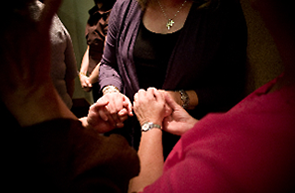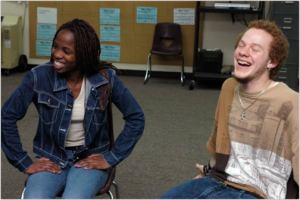News & Announcements
- Details
- Written by Joshua Wachtel
"We must also propose new ways of life ... that means shifting from a punitive mindset to a restorative one."
I'm working on a new eForum article about a program called FaithCARE which applies restorative practices to faith communities and congregations. I've recently had the opportunity to interview Mark Vander Vennen of Shalem Mental Health Network in Ontario, Canada about this project and to talk to Bruce Schenk of IIRP Canada again, who partners with Shalem and has been very active in developing the program.
So it was pleasant to see this piece by Mark which discusses the need for restorative responses in light of a "tough-on-crime" law currently moving its way through the Canadian legislature. I'm reposting the article below, but the original piece can be found in Northumberland Today by clicking here.
- Details
- Written by Samantha White
|
When challenging behavior:
|
To help those affected:
|
| Purchase packs of 100 "Restorative Questions Cards. |
|
- Details
- Written by Joshua Wachtel
As a followup to Wednesday's post about the upcoming student-led initiative in Philadelphia - "End Violence Through Restorative Justice" - organized by The Campaign for Nonviolent Schools on Martin Luther King Day January 16, here is a video that recaps last October's Week of Action Against School Pushout. This video highlights how students and members of the community across the country are increasingly speaking out to promote positive alternatives to zero-tolerance policies, including restorative practices. The first three minutes features many youth voices speaking about their experiences. At minute 6:15 mention is made of The Campaign for Nonviolent Schools' Youth Speakout Against Pushout which happened in Philadelphia that week.
"Throughout the week of October 1-8, 2011, thousands of parents, youth, and educators took part in student-led actions and events in 28 cities to expose the school pushout crisis in our nation and advocate for the human right of every young person to a quality education and to be treated with dignity. The events and actions included street theater, public forums, rallies, restorative justice trainings, and more.
- Details
- Written by Joshua Wachtel
 Here's a post written by Sylvia Clute on her Genuine Justice blog and based on a workshop she attended at IIRP's 14th Conference in Nova Scotia last summer. The workshop was given by Susannah Sheffer and Walter Long, who both advocate for abolishing the death penalty. Sylvia has written about several talks given at the conference, which she has given me permission to re-post. I begin with this one because of a personal connection:
Here's a post written by Sylvia Clute on her Genuine Justice blog and based on a workshop she attended at IIRP's 14th Conference in Nova Scotia last summer. The workshop was given by Susannah Sheffer and Walter Long, who both advocate for abolishing the death penalty. Sylvia has written about several talks given at the conference, which she has given me permission to re-post. I begin with this one because of a personal connection:
I met Susannah Sheffer the other month when I began a new part-time job at North Star Self-Directed Learning for Teens, a community-based education center for teens seeking to pursue their own learning path outside traditional channels. I noticed that Susannah was offering a weekly class called "Harm and Punishment" which smacked of restorative approaches. When I asked her about it she said that she'd presented at Halifax. I said I'd thought I'd come across Sylvia Clute's post about her work, and we've been having conversations about restorative justice and restorative practices ever since.
- Details
- Written by Joshua Wachtel
In Philadelphia, The Campaign for Nonviolent Schools, a citywide, youth-led campaign, is planning an afternoon event titled Ending Violence Through Schools. Workshops include Implementing Restorative Practices, Interrupting Bias Violence, Creating Nonviolent Schools and Ending the School to Prison Pipeline.
The event takes place on Martin Luther King Day, Monday, January 16th, from 1 to 4pm, at Arch St. Methodist Church, 55 N. Broad St, Philadelphia. Pre-register for the event here: www.endingviolence.eventbrite.com
- Details
- Written by Joshua Wachtel
Here's a video showing a multi-faceted Restorative Juvenile Justice Project in Peru. People involved in a wide variety of aspects of the project have been interviewed and there's some striking footage of the country. Jean Schmitz, director of the Latin American Institute of Restorative Practices, an IIRP affiliate, appears briefly. This 14-minute video is in Spanish with English subtitles.
- Details
- Written by Joshua Wachtel
Here's a piece about schools in Scotland, where the number of exclusions (suspensions and expulsions in US parlance) is decreasing. The article quotes Ann Ballinger, general-secretary of the SSTA, Scotland’s second-largest teaching union:
“Restorative justice, staged intervention and the use of organisations like SkillForce have produced gratifying results in a number of establishments, enabling young people to learn appropriately and teachers to work in a calm and supportive environment” ...
- Details
- Written by Joshua Wachtel
I'll be slowing down on posting during the holidays, but I may do quick posts with links to interesting pieces like this one for those who continue to check in. Here's a very personal story about a mediated dialog between a victim of rape and her rapist. Click here: Restorative justice in a case of serious sexual assault — RJ Online.
- Details
- Written by Joshua Wachtel
 Deanna L. Webb earned a Master of Restorative Practices and Education in June 2009 at the International Institute for Restorative Practices (IIRP) Graduate School, through the one-year FastTrack program. She is an eighth-grade special education teacher at a middle school in Easton, Pennsylvania, USA.
Deanna L. Webb earned a Master of Restorative Practices and Education in June 2009 at the International Institute for Restorative Practices (IIRP) Graduate School, through the one-year FastTrack program. She is an eighth-grade special education teacher at a middle school in Easton, Pennsylvania, USA.
When I graduated from college with a degree in special education, I was prepared to offer students specially designed instruction, program modifications and a variety of teaching techniques to match their individual learning styles, as well as tools and techniques they could use to be successful with academics. What I was not prepared for, however, was the need to fill in the blanks in their lives that were not a part of the typical academic school environment. This became especially evident when I began teaching in the emotional support setting. My students all lacked a sense of community, and consequently they also lacked a sense of accountability. During my first few years as a teacher in this setting, I struggled to connect with students and to keep them engaged in the school environment. Some students did very well, but I was unable to reach others. The tools I acquired in IIRP classes and then used in my classroom allowed me to build community and teach accountability and respect to a very challenging population of students.
- Details
- Written by Pam Thompson
 Circles are a great tool for dealing with holiday stress. In a "talking circle," one person speaks at a time, and everyone has a chance to speak and be heard.
Circles are a great tool for dealing with holiday stress. In a "talking circle," one person speaks at a time, and everyone has a chance to speak and be heard.
At CSF Buxmont, we start holding circles to talk about the holidays shortly before Thanksgiving. Some go-around questions include:
- What is your favorite holiday memory?
- What are some of your holiday traditions?
- Who do you celebrate with?
- What are some of your concerns about holiday time?
- What are you worried about for the holidays?
- What would your ideal holiday celebration look like?

Restorative Works Year in Review 2024 (PDF)
All our donors are acknowledged annually in Restorative Works.
